8b unit1 grammar
人教课标版高中英语选修8 Unit1_Grammar名师教学设计
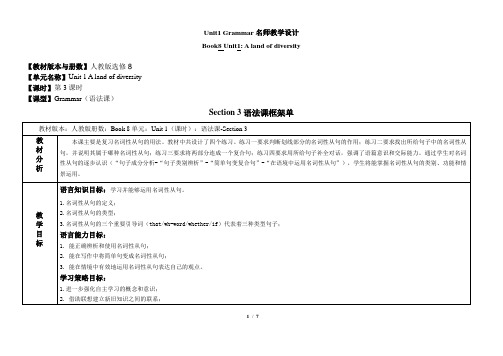
2.T: From the analysis of the sentence patterns, can you tell me what types of noun clauses are there.
S:Noun clauses are classified as subject clause, object clause, predicative clause and appositive clause.
It happened that…碰巧…
It appears that…似乎…
4It is+过去分词+从句
It is reported that…据报道…
It has been proved that…已证实…
It is said that…据说…
it作形式主语和it引导强调句的比较
it作形式主语代替主语从句,主要是为了平衡句子结构,主语从句的连接词有变化。而it引导的强调句则是对句子某一部分进行强调,无论强调的是什么成分,都可用连词that。被强调部分指人是也可用who/whom。例如:
DELC2获取新知识
Step2
Production
(学习
新知)(20mins)
1.Teacher guide Ss to learn the grammar rules of noun clauses.
名词性从句
【概念与分类】在句子中起名词作用的句子叫名词性从句。名词性从句的功能相当于名词词组,它在复合句中能担任主语、宾语、表语、同位语、介词宾语等,因此根据它在句中不同的语法功能,名词从句又可分为主语从句、宾语从句、表语从句和同位语从句。
It hasn’t been decided whether (if) we shall attend the meeting.
牛津高中英语模块8Unit1Grammarproject语言点讲解
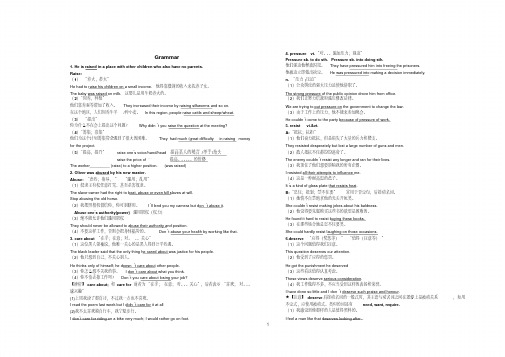
Grammar1. He is raised in a place with other children who also have no parents.Raise:(1)“养大,带大”He had to raise his children on a small income. 他得靠微簿的收入来抚养子女。
The baby was raised on milk. 这婴儿是用牛奶养大的。
(2)“饲养,种植”他们靠养蚕等增加了收入。
They increased their income by raising silkworms and so on.在这个地区,人们饲养牛羊/种小麦。
In this region, people raise cattle and sheep/wheat.(3)“提出”你为什么不在会上提出这个问题?Why didn’t you raise the question at the meeting?(4)“筹集;募集”他们为这个计划筹集资金遇到了很大的困难。
They had much /great difficulty in raising money for the project.(5)“提高,提升”raise one’s voice/hand/head 提高某人的嗓音/举手/抬头raise the price of …提高。
的价格The worker_________ (raise) to a higher position. (was raised)2. Oliver was abused by his new master.Abuse: “虐待;凌辱,”“滥用;乱用”(1)奴隶主有权任意打骂、甚至杀害奴隶。
The slave-owner had the right to beat, abuse or even kill slaves at will.Stop abusing the old horse.(2)我把照相机借给你,你可别瞎用。
8b Unit 1 grammar
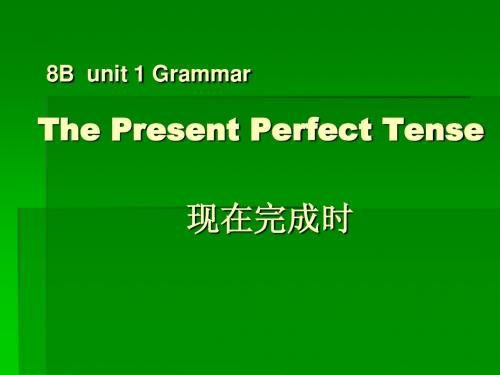
Have you……? 疑问 Has he……?
按要求进行句型转换
1. He has already finished his homework.(一 般问句,并作肯定、否定回答) Has he finished his homework yet ? Yes, he has. No, he hasn’t. /Not yet. 2. I have never been to Beijing before.(一般 问句) Have you ever been to Beijing before? 3. They have learned around five units.(提问)
kept
borrow
have/has kept
The film has begun for 10 minutes.
been on
begin
have/has been on
The concert has finished for half an hour.
been over
finish
have/has been over
有些动词不能和for, since, how long 等连用
• He has bought the book. • He has bought the book for a week. • He has had the book for a week.
She has bought the computer for two years.
15. ______ you _______ (read) today’s newspaper yet? 16. They _____already_____(do) their homework. But they don’t know what_____ (do) next. 17. ---____ you _____ (see) the film last night? ---No, I ___________ (see) it for several times. 18. She ____________ (be) ill for three days. 19. My father ___________ ( buy) a book for me yesterday. He____ already _________(pay) fifty yuan for it. 20. She____________ (not read) this book before. 21. ____ you ever __________ (travel) on a train before? 22. --- ____ Wei Hua _____ (come) yet? ---Yes. She_______ (come) already. She ______ (come) just now. 23. ---How long _____you __________(learn) English? ---For more than two years.
牛津英语8B Unit1 Reading,Grammar练习

8B Unit1 Past and presentReading(1)【学习目标】1.了解北京阳光镇的变化2.学会对比某地过去和现在的情况,并描述发生的变化3.背诵掌握以下词汇southern till married wife over cinema turn factorywaste pollute realize reduce open lonely throw husband interview【课前导学】一、朗读Reading部分,翻译下列词组1.写一写阳光镇的变化__________________________________________________2.很了解阳光镇________________________________________________________3.和我的家人搬家到这里________________________________________________4.在这个城镇的南部____________________________________________________5.一起居住直到1965年__________________________________________________6.搬到另一座公寓______________________________________________________7.在城镇的中心________________________________________________________8.给我们买一个新的公寓________________________________________________9.改变许多____________________________________________________________10.在过去______________________________________________________________11.一个老电影院________________________________________________________12.把这个地方变成一所公园______________________________________________13.与你的老朋友见面____________________________________________________14.在周末见面__________________________________________________________15.打牌和下象棋________________________________________________________16.水污染______________________________________________________________17.过去常常做某事______________________________________________________18.把废料倾倒到河里____________________________________________________19.污染河水____________________________________________________________20.采取措施降低污染____________________________________________________21.干净的多____________________________________________________________22.在某些方面__________________________________________________________23.开阔地和漂亮的公园__________________________________________________24.搬到北京的其他地区__________________________________________________25.感觉有点孤单________________________________________________________26.偶尔________________________________________________________________27.回来看我____________________________________________________________28.使我开心____________________________________________________________【当堂练习】一、根据课文及首字母填空Mr. Chen k____________ Sunshine Town well. He first lived in the s_____________ part of the town in the city with his parents. When he got m_____________ in 1965, he and his w__________ moved to another flat in the centre of the town. They moved again last year.Sunshine Town has changed a lot. In the past, 30000 people lived in the town. They had their own small restaurants, s__________ and market s____________. They also had a small post o___________ and an old c_____________. Now, the place has t_____________ into a park.In some w______________, life is better now. Mr. Chen thinks it’s nice to have o___________ space and pretty gardens. H___________, it has become more difficult to see his old friends. Many of them have moved to other areas and Mr. Chen feels a bit l______________ from time to time.二、根据文章内容判断正误1.Mr Chen knows Sunshine Town very well. _________2.He moved into Sunshine Town in 1965. __________3.He got married last year. __________4.Mr Chen moved out of Sunshine Town when he got married. __________5.In the past,30000 people lived in Sunshine Town. __________6.Mr Chen and his old friend meet in the new park to play cards and Chinese chess.___【课后巩固】一、完成《学习与探究》Unit1 第2课时8B Unit1 Past and presentGrammar(1) 【学习目标】1.识记动词的过去分词2.懂得理解现在完成时【课前导学】一、写出下列动词的过去式和过去分词e ____________ ___________2.see _____________ ____________3.be ______________ ____________4.give____________ _____________5.write____________ ____________6.make____________ ___________7.put_____________ ____________8.go_____________ ____________ 9.see____________ ______________10.forget____________ ___________11.learn____________ ____________12.decide____________ ___________13.repair____________ ___________14.finish____________ ___________15.play____________ _____________二、现在完成时1. 定义:发生在过去的事情或动作,一直持续到现在并有可能继续持续下去。
英语人教版八年级下册UNIT1 Grammar Focus

Section A3(Grammar focus–4c)Step1Revision(Guessing game)Look at the pictures,guess what has happened and revise the important points the students hav e learned.Step2Grammar focusWhat’s the matter?I have a stomachache.You shouldn’t eat so much nexttime.What’s the matter with Ben?He hurt himself.He has asore back.He should lie down and rest.Do you have a fever?Yes,I do./No,I don’t./I don’t know.Does he have a toothache?Yes,he does.He should see a dentist and getan X-ray.What should she do?She should take her temperature.Should I put some medicine on it?—Yes,you should./No,you shouldn’t.4.—What should she do?—She should take her temperature.活学活用1.—She has a stomachache.—She__________eat so much next time.2.—Should she see a dentist and get an X- ray?—Yes,she_______./No,she_________.反身代词反身代词又称为自身代词,表示动作行为反射到行为执行者本身。
8B Unit 1 grammar
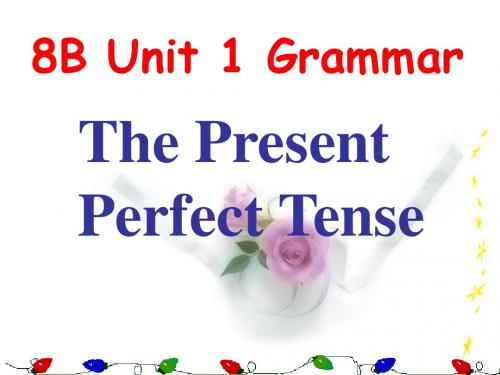
Key words
yet for
ever
never since
have A: How long ______ taught you ________ in this school? (teach ) B: For 6 years.
Key words
yet for just
ever
never since
ever
never since so far
already
up to now in his life
in the past 10 years lately recently
(ever) since then
has lived He ___________ in this city ever since then. (live )
up to now in his life
in the past 10 years
has done He __________ a lot of good things in his life. (do )
Key words
yet for just before
ever
never since so far
比较下列时态
名称 时间
1.v原形 原形
动词形式
2.v+s/es am/is/are+v-ing 1.will/shall+v原形 原形 2.am/is/are going to +v原形 原形 1.v-ed(规则动词) (规则动词) 2.不规则动词 不规则动词 was/were+v-ing
平时, 一般现在时 平时,经常 现在进行时 正在进行
3.He _________basketball at 4:00 p.m. yesterday. was playing
牛津译林版八年级英语上册Unit 1 Grammar示范课教学设计
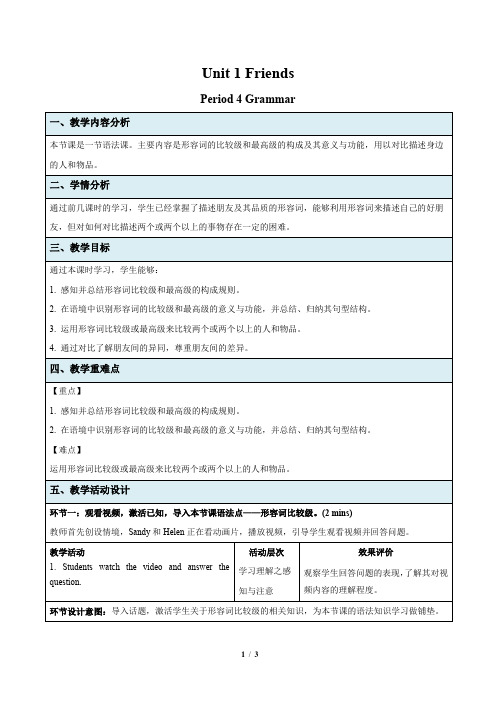
Period 4Grammar
一、教学内容分析
本节课是一节语法课。主要内容是形容词的比较级和最高级的构成及其意义与功能,用以对比描述身边的人和物品。
二、学情分析
通过前几课时的学习,学生已经掌握了描述朋友及其品质的形容词,能够利用形容词来描述自己的好朋友,但对如何对比描述两个或两个以上的事物存在一定的困难。
学习理解之感知与注意、获取与梳理、概括与整合
效果评价
从学生完成活动的情况,判断其对形容词比较级知识的掌握情况。
环节设计意图:引导学生在语境中识别并理解形容词比较级的意义、功能与句型结构。
环节三:归纳总结形容词最高级的意义、功能和句型结构。(9 mins)
教师创设情境,引导学生完成练习,巩固对形容词比较级句型结构的掌握,并在语境中感知形容词最高级的意义和功能。之后,通过自主探究的方式,归纳总结形容词最高级的功能和句型结构。
教学活动
1. Students watch the video and answer the question.
活动层次
学习理解之感知与注意
效果评价
观察学生回答问题的表现,了解其对视频内容的理解程度。
环节设计意图:导入话题,激活学生关于形容词比较级的相关知识,为本节课的语法知识学习做铺垫。
环节二:识别形容词比较级的意义和功能,并归纳总结其功能和句型结构。(9 mins)
12. Students draw pictures of their friends and then write sentences to describe them with the given adjectives.
活动层次
应用实践之内化与运用
迁移创新之想象与创造
译林版英语八年级下册第一单元现在完成时讲解及练习
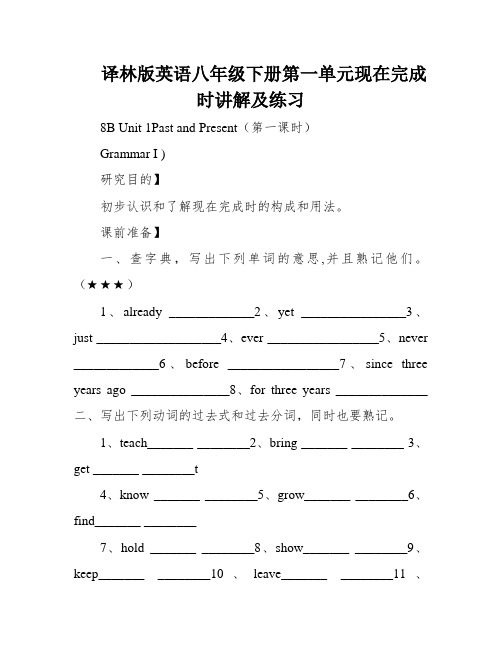
译林版英语八年级下册第一单元现在完成时讲解及练习8B Unit 1Past and Present(第一课时)Grammar I )研究目的】初步认识和了解现在完成时的构成和用法。
课前准备】一、查字典,写出下列单词的意思,并且熟记他们。
(★★★)1、already _____________2、yet ________________3、just ___________________4、ever _________________5、never _____________6、before _________________7、since three years ago _______________8、for three years ______________二、写出下列动词的过去式和过去分词,同时也要熟记。
1、teach_______ ________2、bring _______ ________3、get _______ ________t4、know _______ ________5、grow_______ ________6、find_______ ________7、hold _______ ________8、show_______ ________9、keep_______ ________10、leave_______ ________11、lose_______ ________12、run_______ ________13、swim_______ ________14、drive_______ ________ 15、begin_______ ________三、尝试着阅读下面的知识链接,看看是否可以理解。
知识链接】现在完成时的“完成用法”和“未完成用法”一、现在完成时的结构:助动词have / has +动词的过去分词( Past Participle )其中have / has为助动词,因而它的否定和疑问句形式全部由have / has进行变化。
8B Unit 1Grammar牛津译林英语
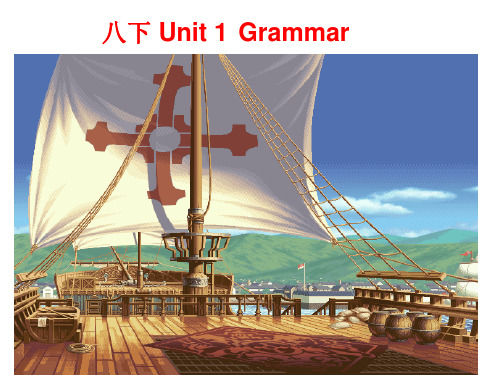
5:对我们来说,像以前那样常见到彼此已变得不可能。
Do you remember Mr Chen?
1.
How long has he lived in Sunshine Town?
He has lived in Sunshine Town since he was born.
2.
Has he ever moved house?
改错:
1.The students have has cleaned the classroom. The classroom is clean now. 2.Mum has cooked cook supper. Supper is ready now. 3.I have see seen the new film. It is interesting. 4.His family have lived lived here since 2000. 5. I have try tried on the hat. It doesn’t suit me.
看P13说出下列动词的过去式和过去分词:
visit visited repair repaired watch watched finish finished
move live love like
visited repaired watched finished
verb+ed
moved lived loved liked
P14 B1. 2. 3.Fra bibliotek4. 5.
6.
have finished They _______________(finish) their homework yeaterday. has visited John ________never_________(visit) China. has repaired Mr Li _____________(repair) over ten bicycles since Monday. seen We haven`t _____________(not see) each other for years. come My parents haven`t _____________(not come) back yet. has taught Our teacher_____________(teach) us a lot about the history of China.
牛津译林版英语八年级下册unit1 Grammar课堂作业(含答案)
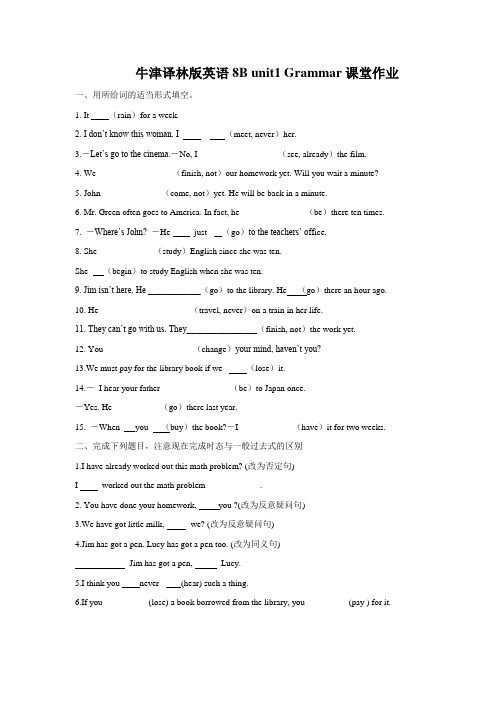
7. He has already finished his homework.(改为否定句)He finished his homework .三、改写句子。
1. Mr. and Mrs. Smith have come back already.(改为否定句)__________________________________________________2. The Whites have lived in China since three years ago. (对划线部分提问)__________________________________________________3. I have learned English for 3 years. (对划线部分提问) _____________________________4. I have lived here for two years. (同义句改写)I _________ here _________________ ago.5. She’s already done her homework.(改为否定句)She____ ______ her homework _________.牛津译林版英语8B unit1 Grammar(2)课堂作业一、用所给词的适当形式填空。
1.has rained2.have never met3.have already seen4.haven`t finished5.hasn`t come6.has been7.has gone8.has studied began9.has gone; went 10has never travelled11.haven`t finished 12.have changed 13.lose 14.has been ; went 15.did buy ;have had二、完成下列题目,注意现在完成时态与一般过去式的区别。
人教版八年级英语下册Unit 1 Grammar导学案
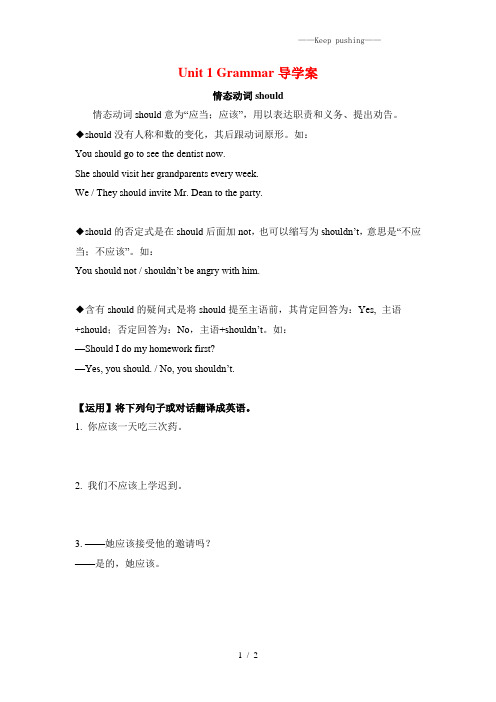
Unit 1 Grammar导学案情态动词should情态动词should意为“应当;应该”,用以表达职责和义务、提出劝告。
◆should没有人称和数的变化,其后跟动词原形。
如:You should go to see the dentist now.She should visit her grandparents every week.We / They should invite Mr. Dean to the party.◆should的否定式是在should后面加not,也可以缩写为shouldn’t,意思是“不应当;不应该”。
如:You should not / shouldn’t be angry with him.◆含有should的疑问式是将should提至主语前,其肯定回答为:Yes, 主语+should;否定回答为:No,主语+shouldn’t。
如:—Should I do my homework first?—Yes, you should. / No, you shouldn’t.【运用】将下列句子或对话翻译成英语。
1. 你应该一天吃三次药。
_____________________________________2. 我们不应该上学迟到。
_____________________________________3. ——她应该接受他的邀请吗?——是的,她应该。
_____________________________________答案1. You should take the medicine three times a day.2. We shouldn’t arrive late for school.3. —Should she accept his invitation?—Yes, she should.教师的职务是‘千教万教,教人求真’;学生的职务是‘千学万学,学做真人’。
牛津深圳版八年级下册 unit 1语法 讲解+练习 (答案不全)
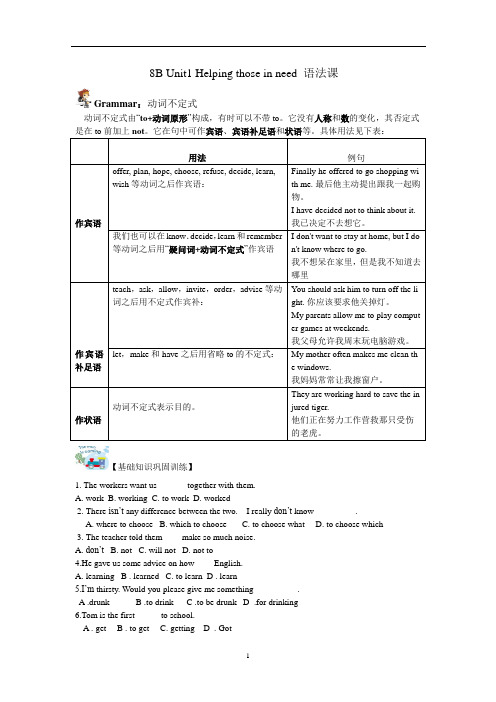
8B Unit1 Helping those in need 语法课Grammar:动词不定式动词不定式由“to+动词原形”构成,有时可以不带to。
它没有人称和数的变化,其否定式是在to前加上not。
它在句中可作宾语、宾语补足语和状语等。
具体用法见下表:用法例句作宾语offer, plan, hope, choose, refuse, decide, learn,wish等动词之后作宾语:Finally he offered to go shopping with me. 最后他主动提出跟我一起购物。
I have decided not to think about it.我已决定不去想它。
我们也可以在know.decide,learn和remember等动词之后用“疑问词+动词不定式”作宾语I don't want to stay at home, but I don't know where to go.我不想呆在家里,但是我不知道去哪里作宾语补足语teach,ask,allow,invite,order,advise等动词之后用不定式作宾补:You should ask him to turn off the light. 你应该要求他关掉灯。
My parents allow me to play computer games at weekends.我父母允许我周末玩电脑游戏。
let,make和have之后用省略to的不定式:My mother often makes me clean the windows.我妈妈常常让我擦窗户。
作状语动词不定式表示目的。
They are working hard to save the injured tiger.他们正在努力工作营救那只受伤的老虎。
【基础知识巩固训练】1. The workers want us ______ together with them.A. workB. workingC. to workD. worked2. There isn’t any difference between the two. I really don’t know _________.A. where to chooseB. which to chooseC. to choose whatD. to choose which3. The teacher told them ____make so much noise.A. don’tB. notC. will notD. not to4.He gave us some advice on how____ English.A. learning B . learned C. to learn D . learn5.I’m thirsty. Would you please give me something ________.A .drunkB .to drinkC .to be drunkD .for drinking6.Tom is the first _____ to school.A . getB . to get C. getting D . Got7. The boy wanted to ride his bicycle in the street, but his mother told him ______.A. not toB. not to doC. not do itD. do not to8. I saw him _______ out of the room. A. go B. had gone C. has gone D. goes9.---_______ more about tomorrow’s weather, call 121. ---OK, I will. Thank you.A. KnowB. KnowingC. To knowD. Known10.We must do everything we can ____ waste water from running into rivers.A. keepB. keptC. to keepD. keeping11.Let’s ____ play in the street. Father tells me __ do so.A. not to;not toB. not;not toC. don’t;to notD. not to;don’t12.When I came into the room, he pretended ____ his homework.A. to doB. be doingC. doingD. to be doingCBDC BBAA CCBA二.用括号中动词的适当形式填空。
8B Unit 1 Grammar 1 动词不定式做宾语和宾补
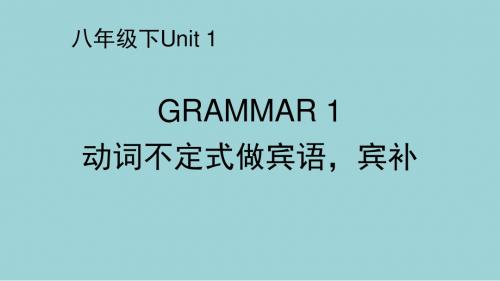
习题链接
D 1.So much work usually makes them ______ very tired. A. to feel B. feels C. feeling D. feel C 2.Look, can you see the boy ______. A. to play tennis B. play tennis C. playing tennis D. plays tennis
作宾语补足语不带to 的情况:
Let me do it. I saw him cross the street.
常见动词有:使役动词: let, make, have 感官动词: see, watch, hear, feel, listen to 注意:感官动词即可接to do,又可接doing,不 定式表示动作的全过程(动作已结束),用动词 的-ing形式表示动作正在进行(动作尚未结束)。
• begin to do • try to do • start to do • go on/continue to do • like to do • stop to do • love to do
• hate to do
• forget to do
• remember to do
习题链接
C some vegetables. 1. He wants ______ A. buy B. buying C. to buy D. buys 2. Don't forget ______ your homework with A you when you come to school. A. to bring B. bringing C. to take D. taking
2022年牛津译林版八年级英语下册《unit 1 Grammar》学案
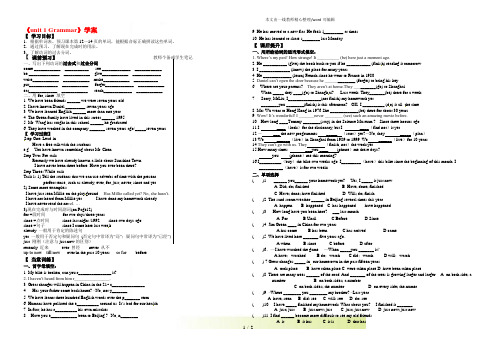
《unit 1 Grammar》学案【学习目标】1.根据单词表,预习课本第12~14页的单词,能根据音标正确拼读这些单词。
2.通过预习,了解现在完成时的用法。
3.了解动词的过去分词。
【课前预习】教师个备或学生笔记一、写出下列动词的过去式和过去分词come ____________ ___________ see _____________ ____________be ______________ ____________ give____________ _____________write____________ ____________ make____________ ___________put_____________ ____________ forget_____________ ____________eat_____________ ____________ teach_____________ ____________二、用for, since 填空1. We have been friends ______ we were seven years old.2. I have known Daniel _________ seven years ago.3. We have learned English ______ more than one year.4. The Green family have lived in this street ______ 1995.5. Mr. Wang has taught in this school ______ he graduated.6. They have worked in the company _______ seven years ago/_____seven years.【学习过程】Step One: Lead-inHave a free talk with the students.e.g. You have known something about Mr. Chen.Step Two: Pre-taskRecently we have already known a little about Sunshine Town.I have never been there before. Have you ever been there?Step Three: While-taskTask 1: 1) Tell the students that we can use adverbs of time with the presentperfect tense, such as already, ever, for, just, never, since and yet.2) Some more examples:I have just seen Millie on the play ground. Has Millie called yet? No, she hasn’t.I have not heard from Millie yet. I have done my homework already.I have never read the no vel. …3)现在完成时与时间副词(on Page12)for +段时间for two days/three yearssince +点时间since last night /1992 since two days agosince +句子since I came here last wee kalready 一般用于肯定的陈述句yet 一般用于否定句和疑问句(否定句中常译为“还”;疑问句中常译为“已经”)just 刚刚(注意与just now的区别)recently 近来ever 曾经never 从不up to now till now over/in the past 10 years so far before【当堂训练】一、首字母填空:1. My bike is broken, can you r_______________ it?2. I haven’t heard from him r________________.3. Great changes will happen in China in the 21st c_______________.4. ---Has your father come back home? –No, not y_______.5. We have learnt three hundred English words over the p_______ term.6. Humans have polluted the e__________ around us. It’s bad for our hea lth.7. In fact, he has r__________ his own mistakes8. --Have you e____________ been to Beijing ?--No, n________. 9. He has moved to a new flat. He feels l_________ at times.10. He has learned to skate s________ last Monday.【课后提升】一、用所给动词的适当形式填空:1. Where’s my pen? How strange! It __________ (be) here just a moment ago.2. He ___________ (give) the book back to you if he ___________ (finis h) reading it tomorrow.3. I ______________ (know) the place for many years.4. He _____________ (learn) French since he went to France in 1980.5. Daniel can’t open the door because he ______________ (forget) to bring his key.6.---Where are your parents?---They aren’t at home.They __________(go) to Shanghai.---When _____ they ____(go) to Shangh ai? --- Last week. They_______(be) there for a week.7. ---Sorry, MrLiu, I_______________(not finish) my homework yet.---________you ________(finish) it this afternoon? --OK. I __________ (d o) it all the time.8. Mrs Wu went to Hong Kong in 1976.She _____________(be) there for about 30 years.9. Wow! It’s wonderful! I _______never ________ (see) such an amazing movie before.10.--How long ____Tommy ________(stay) in the Science Museum ? --Since three hoours ago.11.I ____(look)for the dictionary, but I ____(find not)it yet.12.-___ the new programmes _____ (start)yet?-No, they _____(plan).13.We ______(live)in Shanghai from 1989 to 1999. We ______(live)for 10 years.14.They can’t go with us. They(finish, not)the work yet.15.How many times ___you ____ (phone)me these days?you (phone)me this morning?16.I__________(buy)the bike two weeks ago. I_________(have)this bike since the beginning of this month. I___________(have)it for two weeks.二、单项选择( )1. --- ______ you______ your homework yet? ---Yes, I _____ it just now.A. Did; do; finishedB. Have; done; finishedC. Have; done; have finishedD. Will; do; finish( )2. The sand storm weather ______ in Beijing several times this year.A. happenB. happenedC. has happened . have happened( )3. ---How long have you been here? ---___ last month.A. ForB.UntilC.BeforeD.Since( )4. Jim Green ____ in China for two years.A.has comeB.has beenC.has arrivedD.came( )5. We have lived here _______ five years ago.A.whenB.sinceC.beforeD.after( )6.—I have watched the game. —When _____you _______ it?A.have;watched B do;watch C did;watch D will;watch( ) 7 Great changes _____ in our hometown in the past fifteen years .A. took placeB. have taken placeC. were taken placeD. have been taken place( )8. There are many trees ______ of the road. And _______ of the trees is growing larger and larger. A. on both side; a number B. on both sides; a numberC. on both sides; the numberD. on every side; the numer( )9. –Where ________ you ________ my brother? –Last year.A. have; seenB. did: seeC. will: seeD. do: see( )10.---I have _____ finished my homework. What about you? ---I finished it _______.A. just; justB. just now; justC. just; just nowD. just now; just now( )11. I find ______ become more difficult to see my old friendsA. itB. it hasC. it isD. that has( )12.. —Do you know Simon?— Yes, I ______ him for a long time.A. knewB. have knewC. have knownD. known( )13. --Have you finished your homework?-- ____. Just half of it. How about you?A. Not at allB. Not likelyC. Not a bitD. Not yet( )14. ---Have you given the book back to the library_______?---Yes, I have ______ given it back.A. yet, yetB. already, alreadyC. yet, alreadyD. already, yet( )15. --________ you _______ your breakfast yet?--Yes, I have. I __________ it at 6:30.A. Do; have; hadB. Have; had; have hadC. Do; have; haveD. Have; had; had三、句型转换1.I have been to Beijing before.(改为否定句和一般疑问句)I __________ ____________ to Beijing before. _______ _______ been to Beijing before?2.He hasn’t met his parents for three years. (同义问)He hasn’t met his parents _________ three years _________.3.He has learned English for 5 years.(提问) ______ ______ _______ ________ learned English ?4.I bought a new bike just now.(用just改写) I ________ _________ _________ a new bike.5.We have lived here since 1999.(提问) _______ _________ ________ _______ ________ here?6.She has already finished the work. (改为否定句和一般疑问句且作肯定和否定回答)She _________ _________ the work _________.--_________she _________ the work _________? --Yes,she ______. /No,she________.7.He’s never seen his father,_____________ ____________?(反意疑问句)8. They have gone to Paris,_____________ ____________?(反意疑问句)四、翻译句子1.她学习英语已3年了。
译林版八年级下册英语 8B Unit 1-Unit 8词组句型汇总

8B Unit1词组句型Comic&Welcome to the unit(P6)1.过去常常做某事used to do sth2.对某人友善be kind to sb(P7)3.在不同时期at different times4.不同形式的交通工具different forms of transport5.轮流做某事take turns to do sth.6.等下一班需要很长时间。
It took a long time to wait for the next one.Reading(P8)1.采访某人(两种表达)interview sb.=have an interview with sb.2.非常了解…know…very well3.自从我出生起since I was born4.搬家move house5.在城北in the northern part of town6.结婚get married7.搬离两个街区move two blocks away8.自从那时起since then9.变化很大change a lot10.在那些年里over the years11.在小镇中心in the town centre12.把…变成…turn into13.小镇的部分地区part of the town(P9)14.一家钢铁厂a steel factory15.把垃圾倒入河道put the waste into the river16.认识到这个问题realize the problem17.改善形势improve the situation18.从某种意义上说in some ways19.和以前一样经常看到彼此see each other as often as before20.下象棋play Chinese chess21.感到有点孤单feel a bit lonely22.有时,不时from time to time(P11)23.他的一生all his life24.阳光镇的变化the changes in Sunshine TownGrammar(P14)1.在过去的那个世纪over the past/last century2.北京的过去和现在Beijing’s past and presentIntegrated skills+Study skills(P15)1.做一个关于…的历史课题do the history project on sth2.生活条件living conditions3.火车站railway station(P16)4.进城出城travel to and from the town5.另一个大的变化是…Another big change is…6.当地人local people7.从美国回来return from the USA8.你们上一次看到对方是什么时候?When did you last see each other?9.出国go abroad10.在读小学be at primary school11.保持联系keep in touch with each other12.通过电子邮件交流communicate by email13.使得交流容易得多make communication much easier(P17)14.一条河穿过镇中心A river runs through the centre of town.15.习惯于做某事get/be used to doing sth16.(某人)独自on one’s own17.生活的变化changes in/of(one’s)lifeTask(P19)1.在过去的几年里月光镇发生了很多变化。
牛津译林版八年级英语下册Unit1-2Grammar现在完成时课件
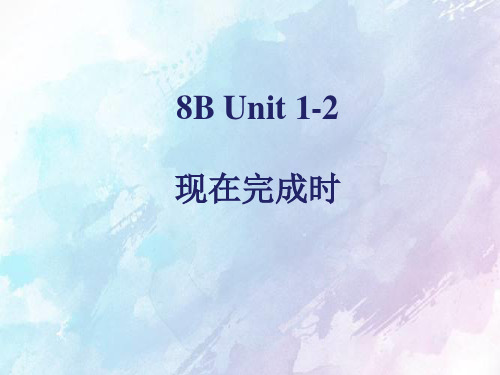
Eddie has eaten my food.
埃迪吃了我的食物。
Eddie ate my food and now Hobo has nothing to eat.
(“居住”这个动作从4年前延续到现在,可能还会继续延续下去。)
Language points
一、现在完成时的含义
(1)现在完成时表示过去发生或已经完成的某一动作对现在造成 的影响或结果。(汉语中常用“已经”、“过”、“了”等表达) 通 常与表示包括现在在内的时间副词just(句中), already(句中,句末 ), before(句末), yet(句末), never(句中), ever(句中) ,recently(句末)等状语连用。例如:
(B) 不规则动词的过去分词 (Page122)
原形 过去式 过去分词 原形 过去式 过去分词
do did done go went gone see saw seen buy bought bought put put put build built built
eat ate eaten find found found forget forgot forgotten come came come cut cut cut write wrote written
Eddie has lived with Millie since he was born. 埃迪自从出生以来,一直和米莉住在一起。
(“居住”这个动作从出生一直延续到现在,可能还要继续延续下去。)
Eddie has lived with Millie for four years. 埃迪已经和米莉居住在一起四年了。
2021年牛津译林版中考英语复习讲义(考点归纳及练习)(8B Unit1)
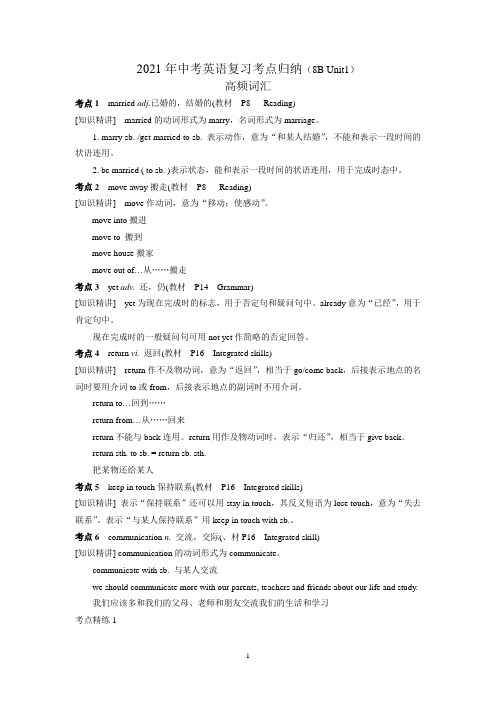
2021年中考英语复习考点归纳(8B Unit1)高频词汇考点1 married adj.已婚的,结婚的(教材P8 Reading)[知识精讲] married的动词形式为marry,名词形式为marriage。
1. marry sb. /get married to sb. 表示动作,意为“和某人结婚”,不能和表示一段时间的状语连用。
2. be married ( to sb. )表示状态,能和表示一段时间的状语连用,用于完成时态中。
考点2 move away搬走(教材P8 Reading)[知识精讲] move作动词,意为“移动;使感动”。
move into搬进move to 搬到move house搬家move out of…从……搬走考点3yet adv. 还,仍(教材P14 Grammar)[知识精讲] yet为现在完成时的标志,用于否定句和疑问句中。
already意为“已经”,用于肯定句中。
现在完成时的一般疑问句可用not yet作简略的否定回答。
考点4 return vi.返回(教材P16 Integrated skills)[知识精讲] return作不及物动词,意为“返回”,相当于go/come back,后接表示地点的名词时要用介词to或from,后接表示地点的副词时不用介词。
return to…回到……return from…从……回来return不能与back连用。
return用作及物动词时,表示“归还”,相当于give back。
return sth. to sb. = return sb. sth.把某物还给某人考点5 keep in touch保持联系(教材P16 Integrated skills)[知识精讲] 表示“保持联系”还可以用stay in touch,其反义短语为lose touch,意为“失去联系”。
表示“与某人保持联系”用keep in touch with sb.。
- 1、下载文档前请自行甄别文档内容的完整性,平台不提供额外的编辑、内容补充、找答案等附加服务。
- 2、"仅部分预览"的文档,不可在线预览部分如存在完整性等问题,可反馈申请退款(可完整预览的文档不适用该条件!)。
- 3、如文档侵犯您的权益,请联系客服反馈,我们会尽快为您处理(人工客服工作时间:9:00-18:30)。
regular: v.+ed e.g chang— changed—changed clean—cleaned—cleaned liAAA ABB ABC
original cost read meet catch ride speak begin drink eat
THANK YOU
8B Unit1 Grammar
2010.4.19
Look and think
1.I have just eaten it .
2.You have changed too.
Present perfect tense
现在完成时
现在完成时的构成
助动词have/ has+p.p(过去 分词)
forms of p.p
动 词 填 空:
Have cleaned 1._____ you already________ (clean) the room?
have done Yes. we __________(do) that already. seen Has 2.______ he ______(see) this film yet? Yes. Have been 3. _____you ever ______(be) there many times?
二.表示从过去某一时刻开始并一直延 续到现在的动作或状态,但动作或状 态可能仍在继续。
She has lived here since she was born.
I have taught English for 26 years.
现在完成时的基本句型
①肯定形式。主语+ have/has+ 过去分词+其它e.g. I have done my homework She has gone to her school. ②否定形式。主语+ have/has+ not+过去分词+… (在助动词have/has后+not,可缩写为 haven’t/hasn’t)e.g. I haven’t done my homework. She hasn’t gone to her school.
③一般疑问句形式及其答语。 Have/Has+主语+过去分词+…?
肯定回答:Yes , 主语+ have/has. 否定回答:No , 主语+ haven’t/hasn’t. -Has she gone to her school? -Yes, she has . ( No,she hasn’t.)
p.t cost read met caught rode spoke began drank ate
p.p cost read met caught ridden spoken begun drunk eaten
现在完成时的主要用法
一.表示过去发生或已完成的某一动作 对现在造成的影响和结果。
He has just turned on the lights. I have already finished my housework.
gone has 4.He_____already_________(go)to Beijing.
have read 5.I____________(read)the book twice.
homework
1.Revise
present perfect tense 2.Do period 5 、6 (wb)
